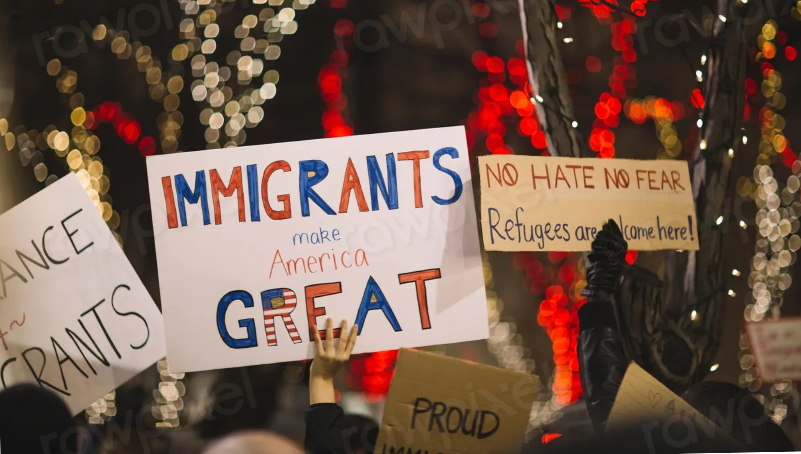
The Republican Party is spewing blatant lies in order to stoke fear of a border “invasion.” Republican politicians scapegoat immigrants while immigrants continue to fuel our economy and rebuild many of our communities throughout the United States. The 2022 midterm congressional elections again brought out attacks on immigrants and Latinos without addressing the importance of providing legal status to the 11 million undocumented immigrants. The 2024 presidential and congressional election is now doing the same, using anti-immigrant hate speech to garner votes for the Republicans.
Undocumented immigrants are subject to reactionary attacks including efforts to curtail immigration from Latin America by creating more border walls and using the desert as a weapon of death. Moreover, undocumented immigrants are subjected to exploitation, repression and abuse by the Department of Homeland Security, Border Patrol, and Immigration and Customs Enforcement (ICE).
But immigrants and their friends and allies in organized labor and their communities continue to fight hard for their rights. They are demanding an end to deportations that rip families apart and to the abusive apprehension and detention of immigrants and asylum-seekers. They are insisting on humane, practical solutions that will benefit both immigrant and U.S. born workers, including the legalization of the status of undocumented workers through comprehensive immigration reform. The primary obstacle to this continues to be the Republican Party, the power of the filibuster, and the packing of the federal judiciary with anti-immigrant judges. The ultra-right continues to slander immigrants, often in blatantly racist terms, as criminals, terrorists and leeches.
In response to the all-out attack on immigrant workers and their families during the Trump administration, millions of new citizens registered to vote and engaged in the political process like never before, contributing greatly to Joe Biden’s win in 2020. But Trump and his allies, with their barrage of lies, nativist reactionary rhetoric and hate speech, have many people confused on the subject of immigration and its impact on our society, especially on U.S. workers. This pamphlet attempts to refute some of these lies and slander with the facts and to be a guide for our own actions.
Why are so many immigrants coming to the United States?
- U.S. corporations prefer insecure low wage workers from Latin America and the Caribbean. Hard-working migrants come to the U.S. looking for a better life, many of them fleeing violence in their homelands. These especially vulnerable migrants are less likely to unionize and demand better wages and labor conditions. Big corporations in the United States and other rich countries prey on the vulnerable, sending labor recruiters into economically depressed regions of Mexico and Central America to find workers.
Fighting back, Mexico put into place policies of price supports, rural farmer production supports, free fertilizer programs and other programs that have helped keep Mexican farmers on their land. People do not flee their countries and communities for no reason.
- Working people and poor farmers in Mexico, Central America, the Caribbean and other parts of the world have been devastated by the practices of the U.S. and big transnational corporations. So-called “free” trade treaties like the North American Free Trade Agreement (NAFTA) and the Central America-Dominican Republic Free Trade Agreement (CAFTA-DR) imposed conditions that prevented poorer countries from meeting their people’s needs. Such trade agreements serve capitalist interests where jobs are outsourced for cheap labor in the accumulation of profits, and where they recruit vulnerable workers to work in substandard conditions in the U.S.
- After NAFTA came into force, more than 1.3 million Mexican farmers were driven out of business. CAFTA-DR had a similar impact in Central America and the Dominican Republic. U.S. agribusiness, subsidized by our tax dollars, has sold grain and other products in the poorer countries at prices below the production costs of their farmers., driving them out of business. In the years immediately following NAFTA’s inception, Mexican undocumented immigration to the United States rose 60%, with similar patterns in other countries linked to these agreements.
- Moreover, economic stagnation and a long history of imperialist interventions have led to political instability and an increase in violence and crime in these and other countries. This has sent thousands of children and families fleeing from some areas, especially the Central American countries of Honduras, El Salvador and Guatemala, and in Caribbean countries such as Haiti.
Mexico also proposed permanent jobs in a reforestation project. Mexico is currently paying for many of these projects in several Central American and Caribbean countries, while the U.S. will not accept this proposal nor offer funding to expand these programs. Mexico also proposed a legal path to migration to the U.S. by these workers, but this, too, was refused by the U.S.
- Global warming and the deterioration of the environment, caused largely by the industrialized nations’ over-consumption of fossil fuels, has destroyed the livelihood of many farming families. This is especially true in Central America, where many can no longer survive in their home countries. Droughts caused by global climate change in Central America drive people north. Global climate change has led to massive tropical storms and hurricanes, another factor causing massive displacement of people unable to grow enough food to feed their families.
- The big corporations and other wealthy interests that exploit workers, both immigrants and non-immigrants, prey on such economic and other hardships to divide the working class and increase their own wealth and power.
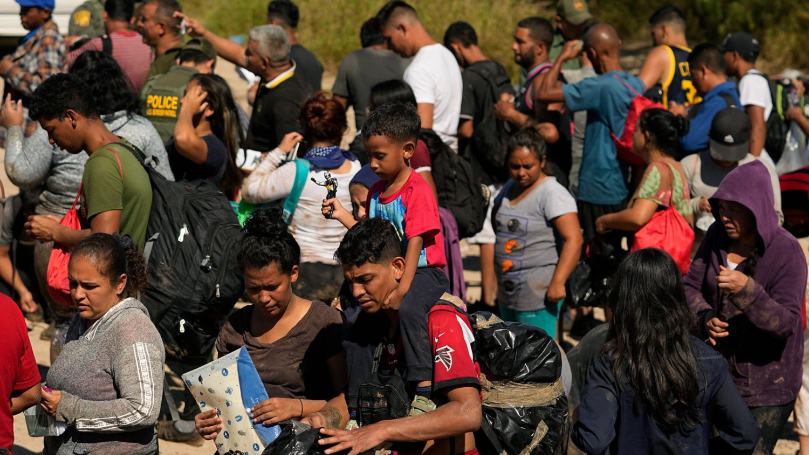
So why don’t people in those countries fix their situations at home instead of coming here?
- U.S., Canadian, European and other multinational corporations have put heavy pressure on these poorer countries to keep their economies open to penetration from outside corporations.
- When these countries resist this pressure, the governments of the United States and the other wealthy countries often intervene with threats, bribery, and even military force to stop union and farmer organizing and political change from taking place.
- With this pro-corporate foreign policy, the U.S. has at different times sponsored coups, civil wars and dictators in Haiti, El Salvador, Guatemala and Honduras.
- The U.S. has also supplied military aid to client states with the objective of protecting U.S. foreign interests throughout history. PLAN MERIDA was signed into law in 2008 between the governments of the United States, Mexico and the countries of Central America ostensibly as a means of combating organized crime. Since the initiative began, the drug war in Mexico in particular has turned into a quasi-genocide resulting in huge loss of life through armed violence with the majority of illegal weapons smuggled in from the U.S.
- Sanctions which cause economic chaos have been imposed on Venezuela, Cuba, and Nicaragua, countries that oppose U.S. imperialism, by the U.S. and other countries. This has led to a sharp increase in immigration from those countries. Biden’s parole program for Cubans, Haitians, Nicaraguans and Venezuelans (CHNV) is capped at a fraction of what is needed, and the program requires a U.S.-based financial sponsor and money for airfare, among other limiting factors.
My grandparents came from Europe legally. Why can’t people from Mexico and these other countries do the same? Why do they butt ahead in line?
- It is not a matter of “butting in line.” There is no line for them to get into! The U.S. government issues exceedingly few legal resident visas to displaced farmers and low skilled workers. To get a U.S. permanent resident visa, immigrants are required to present proof of income, sponsorship and employment that are hard to get for people fleeing poverty and violence in poor countries.

- Even people married to permanent legal residents often have to wait years to join their spouses in the United States. This is a different situation from the one many of our grandparents faced. Today it is nearly impossible for people who don’t have specialized skills or close relatives in the U.S. to come at all. People in the United States who want to sponsor relatives to come here need to prove a certain level of financial ability to support them and can only sponsor those with a close familial relationship.
The Trump administration greatly increased the detention of immigrants, even those who committed no crime, and is expected to do so again if elected in 2024. Trump has promised/threatened mass deportations, detention camps and an expanded border wall if he wins in November.
- The U.S. government has a low approval rate of asylum cases, and makes it extremely painful for any asylum-seeker to pursue it. In January 2019, the Trump administration began the infamous “Remain in Mexico” program, making requesting asylum exceedingly dangerous by requiring many if not most asylum-seekers to remain in squalid camps in Mexican border towns. There they were subjected to rape, murder, kidnapping and other crimes while awaiting their court dates in the U.S. for months or potentially years. In March 2020, The Trump administration effectively ended the right to seek asylum at the borders with the Title 42 program, put into place, allegedly, for public health reasons during COVID. The Biden administration later ended both policies with some difficulty due to Republican court challenges. Both policies violated human rights and U.S. and international asylum law by closing the border to hundreds of thousands of asylum-seekers. If elected, Trump has promised to seek other ways of closing the border.
- Disappointing many in the immigrants’ rights community, Biden implemented his “Securing the Border” program in June 2024. This policy effectively bars asylum for any person crossing the border between ports of entry, in direct contravention of U.S. and international law. Congress needs to authorize the necessary funds to provide due process to all asylum-seekers at the border, and Biden and his successor must be pressured to provide a fair, complete and efficient process for all who are seeking asylum without increasing militarization of the border, and to fulfill his campaign promises. Previously, Trump threatened Mexico with harsh tariffs if Mexico did not stop the caravans of asylum-seekers transiting through Mexico. Most likely, Trump will worsen the attacks on immigrants and possibly militarily attack Mexico as advocated by some Republican Senators.
- Trump and Stephen Miller have made it clear that they intend to begin mass deportations on Day 1 of any potential new Trump presidency. They will engage the national guard and potentially U.S. military to help ICE and Border Patrol arrest anyone suspected of being undocumented and send them to hastily built “camps” in the Southwest desert near the border. But undocumented immigrants are unknown to the government by their very definition, so how does Trump think he will find them? By sending Border Patrol, ICE, and quite possibly the National Guard and the U.S. military into immigrant, black and brown communities to terrorize people more than they already are.
Do immigrants cause unemployment?
- There is not a fixed number of jobs in our economy. The truth is that immigrant workers and their families create more jobs than they fill, by spending money on goods and services and starting new businesses, among other economic factors.
- The real causes of unemployment are rooted in the decreasing wages being paid to all workers. Our country’s workers can no longer afford to buy the products and services they produce.
- Immigrant workers are not responsible for the millions of jobs wiped out by the closing of plants around the nation, nor for the outsourcing of jobs. Union jobs in the U.S. are wiped out by U.S. corporations taking their manufacturing to other countries in pursuit of higher profits. Massive job loss occurs when employers increase the workloads of some workers while laying off others, or increasing the use of technology at the expense of workers. Such predatory capitalist posturing for profit often unjustly and inhumanely puts blame on immigrant workers for the loss of jobs.
Do immigrants drive down U.S. wages?
- It is true that today U.S. workers are seeing their wages drop. This is especially true for young and minority workers. But more than anything, this is due to right-wing politicians who refuse to raise the minimum wage and push right-wing policies that deny workers the right to form unions.
- Employers will always take advantage of workers who lack the right to defend themselves, pitting one group of vulnerable workers against the rest.
- Immigrants are not the cause of higher unemployment among African American or other minority workers. The continued toleration of racial discrimination in hiring and setting wages, the dismantling of affirmative action, and weak labor laws are to blame.
- The only effective response is to fight for equal rights and equal treatment for all workers. That is why legalization of the status of immigrant workers, with full labor and civil rights, is in the best interests of all workers.
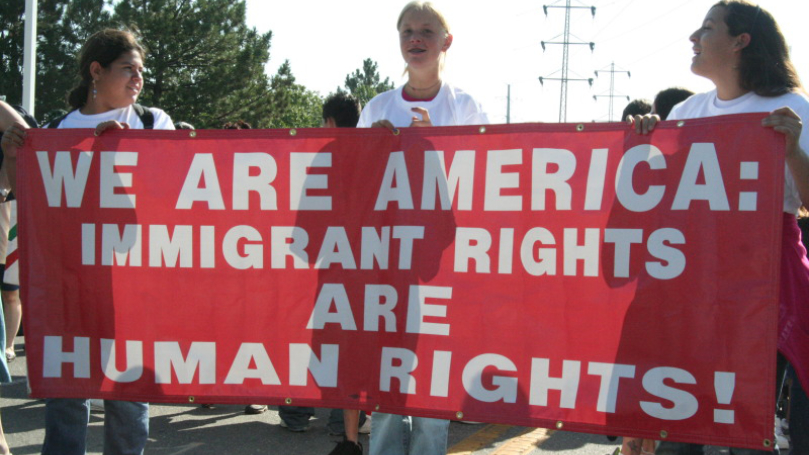
Do immigrants join labor unions?
- Immigrant workers, even those without documents, have been at the forefront of many recent and ongoing labor struggles, including organizing drives and strikes.
- Employers regularly use the threat of arrest and deportation to break up union actions in which immigrant workers are involved.
- Immigrant workers have been a major factor in the struggle for the $15 an hour minimum wage, the Walmart struggle, and many other campaigns. They are helping to rejuvenate U.S. organized labor and would be even more active if they did not have to fear deportation or detention.
- This is why the AFL-CIO and many individual unions strongly and actively support the immigrants’ rights struggle.
Do immigrants pay their fair share of taxes?
- Like other workers, most undocumented and documented immigrant workers have both federal and state income taxes deducted from their paychecks — but undocumented workers are often unable to claim their refunds. Additionally, an undocumented worker picking tomatoes in Florida pays more income taxes proportionately than many a corporate executive.
- Undocumented workers pay $13 billion a year in Social Security taxes (according to the Social Security Administration, $100 billion over the last decade) but are ineligible to collect benefits.</.span>
- Immigrants, documented or not, pay sales tax every time they buy something. They pay property taxes too, either for property they own or through rent paid to the landlord. When it comes to state and local taxes, undocumented immigrants pay more than $11 billion a year.
What about the crime rate among immigrants?
- Numerous studies consistently show that the rate of violent and property crime among immigrants, with or without documents, is lower than that of comparable segments of the U.S. citizen population. Anti-immigrant agitators try to give the opposite impression by highlighting isolated cases of shocking crimes, and telling blatant lies about crimes that are not occurring.
- In a crass attempt to exploit people’s despair over the growing fentanyl addiction, the right-wing promotes the myth that immigrants are smuggling fentanyl into the country. In reality, over 90 percent of the fentanyl that is seized coming into the country via the southwest border comes through regular ports of entry, transported by people, half of whom are U.S. citizens, with legal authorization to cross the border. And the drug cartels paying these people to smuggle drugs get most of their weapons, made by U.S. manufacturers, smuggled into Mexico from the U.S.
What about terrorism?
- Undocumented immigrants were not connected to 9-11 or any other more recent terrorist attack. Every one of the 9-11 terrorists came here on a legal visa issued by the U.S. State Department.
- The overwhelming majority of undocumented and documented immigrants have nothing to do with terrorism; they come here to work, find safety and be with family.
- Recent refugees from Syria, Iraq, and Afghanistan, always accused of being terrorists by the U.S. right, have been carefully vetted before being allowed into the United States. Many of them provided vital services to the U.S. and international military at great risk to themselves and their families during the West’s many military excursions there.
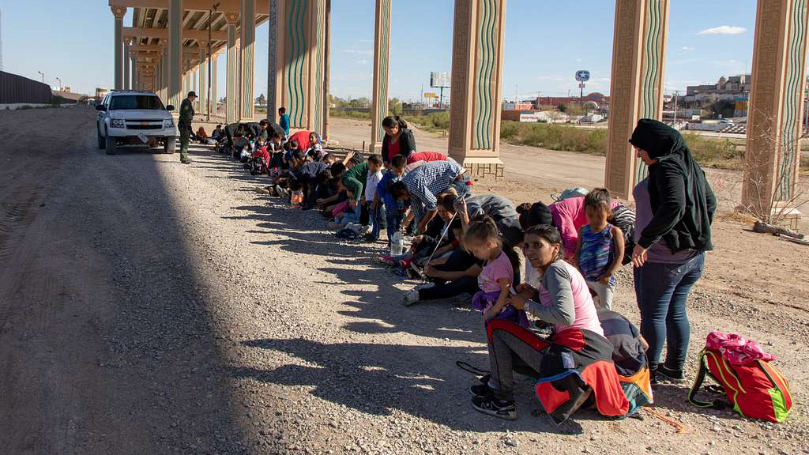
What is the impact of immigrants on social, health care, and educational services?
- Immigrant workers are not getting a free ride. Most immigrant workers pay the same federal, state, and local taxes as others, which finance our schools, health clinics, and other public services.
- Immigrant workers, alongside their native born coworkers, generate fortunes for their employers in industries such as agribusiness, meatpacking, elder care, and construction.
- However, Republican presidential administrations since Reagan, and Republicans in Congress, have given the super-rich huge tax cuts. The Trump administration did this once more with the giant 2017 tax giveaway to the one percent. If these tax cuts were rolled back, and if the bloated military budget were drastically cut, there would be enough money to finance services for all who need them, immigrants and U.S. born.
- There is no evidence that new immigrants pose a public health danger to their neighbors. Indeed, studies show that they are, on the whole, healthier than comparable sectors of the U.S. population.
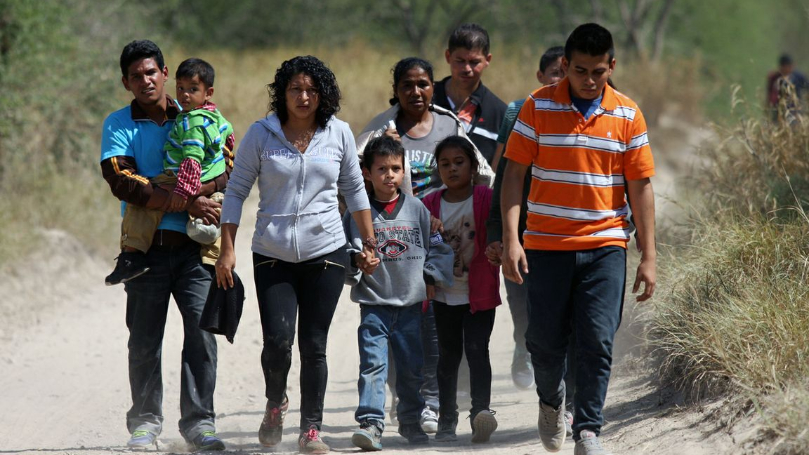
Do immigrants threaten the English language and American culture?
- There have always been other languages spoken alongside English in the United States, including Native American languages, Spanish, French, and German dialects. The different language communities have enriched our country culturally, not harmed it. We should encourage ethnic groups to maintain their native languages and cultures; this contributes greatly to the cultural richness of our communities and keeps languages alive.
- As a multilingual, multicultural country, the United States has never had an “official” language, and there is no need for one. Our country’s experience has been that, while new immigrants may struggle a bit with the English language, the second generation almost always speaks English fluently. This is just as true of Latino, Asian, and African immigrants today as it was of other immigrants in the past.
- All over the country, classes for English as a second language are jam-packed, due to the strong desire in immigrant communities to learn English. The vast majority of new immigrants believe fervently in democracy, family, and freedom, and thus are a boon to our country, not a menace.
What is really behind the anti-immigrant furor?
- Right-wing politicians continue to want to distract the public’s attention from the failures of the capitalist system and their own anti-worker policies. These failures have cost U.S. workers millions of jobs, homes, savings, income, and their sense of security. Rather than having public anger focus on the real culprits—the “one percent” and their political enablers—the ruling class tries to scapegoat immigrants with and without papers.
- Big business interests want cheap labor without rights, creating an easily exploitable workforce, so they whip up hysteria with stories about immigrant “rapists” and “drug dealers” and Muslim “terrorists.”
- Racism and ethnic prejudice, prejudice against non-English languages and non-Christian religious faiths, particularly Muslim, is a very strong element in the anti-immigrant agitation. The current efforts to keep families and children fleeing violence in Central America out of the U.S. has a strong racist tinge. The growth in vigilante harassment and violence against migrants and asylum-seekers is another manifestation of racism embedded in U.S. culture.
- The political right in the United States and big business interests fear that immigrants, if empowered to vote and participate politically, will support candidates and policies that are not aligned with the interests of the one percent.
What is the solution?
The solution is not to hang a “keep out” sign on the Statue of Liberty’s torch. The solution is not to waste taxpayer money on a useless and environmentally destructive fence or wall at the border. The solution is to carry out comprehensive, worker-friendly immigration reform including:
- Legalization of the status of all currently undocumented immigrants, with a clear path to citizenship so they can vote and participate in the political system if they so choose. Support the Registry bills: H.R. 1511 and S. 2606, which would allow undocumented immigrants who have been in the U.S. seven years or more to adjust their status to lawful permanent residents. Support the broadened access to permanent residence status and other positive aspects of the U.S. Citizenship Act of 2023-24, H.R. 3194, while rejecting any increase in border militarization funding called for in the bill.
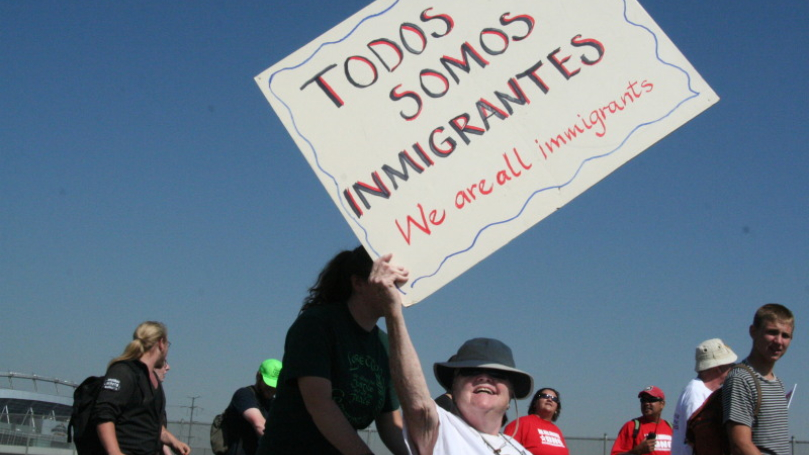
- All temporary protected status (TPS) recipients should be allowed to become permanent residents immediately.
- Reject “guest worker” programs that keep workers from other countries in conditions of near peonage while they undermine the wages of other workers in this country. Advocate for changes in U.S. visa policies so that working people who need to come here can do so legally without risking their lives, violating immigration laws, or getting stuck in “guest worker” programs in which their rights are regularly violated.
- End racial and national prejudice and discrimination in the administration of U.S. immigration laws; end border enforcement policies that have exposed immigrants from Mexico, Central America and the Caribbean to discrimination, abusive detention practices, violent acts by authorities and sometimes death. Challenge the attacks against critical race theory and whiteness studies, which are a means of addressing racism, and the normalization of the plague of racial prejudice and discrimination in the U.S.
- Give immigrant workers the same rights on the job and in the community that other workers have, so that they can join unions and fight together with other workers for better wages and working conditions.
- Change U.S. international trade and foreign policy so that the development of the economies of poorer countries is no longer undermined by multinational corporations and U.S. government interference. Stop supporting abusive and corrupt right-wing governments in other countries whose policies force people to migrate.
- Effectively put the brakes on global warming so that rural people in other countries are not driven off their lands. Support innovative programs like Mexico’s reforestation program that seek to reverse some of the damage done to the Earth.
- While work is done on legislation for a comprehensive immigration reform, suspend all deportations and end programs like 287(g), which delegate immigration enforcement tasks to local police, leading to racial profiling and other abuses, as well as the requirement that employers use E-Verify to check on the immigration status of new hires. Take a stand against and work to end racist, anti-immigrant bills such as Texas S.B. 4 of 2023 which allows local police to arrest people for illegally crossing the U.S./Mexico border.
- It is cruel and irrational to deport people who will qualify for legalization once comprehensive immigration reform takes place. This is expected to happen with passage of the U.S. Citizenship Act of 2023-24, H.R. 3194. Per Biden instructions, ICE can now use prosecutorial discretion to dismiss court proceedings that lead to deportations. Advocate for ICE prosecutors to dismiss all deportation cases.
Demand that local, county, and state police agencies disconnect themselves from Homeland Security, Border Patrol, and ICE. Lobby legislative and executive officials and pressure them not to discriminate against the foreign born, including those without papers, in the provision of social services such as schools, college scholarships and tuition, health care, and housing.
- Through Congressional legislation, DACA (Deferred Action for Childhood Arrivals), with a path to citizenship, must be enacted for all DREAMERS.
- Demand deferred action and a pathway to citizenship for undocumented immigrant workers involved in complaints against employers. Demand citizenship for all essential workers.
- Support and protect asylum-seekers and other vulnerable populations by providing a way to safely present at the border and request asylum without fear of detention or deportation.
People fleeing violence and persecution in their countries of origin have a long recognized right to request asylum under international and U.S. law.
- Keep on marching, protesting, and speaking out for the rights of all immigrants.
- Keep on fighting against racial profiling and all forms of racism and ethnic bigotry and discrimination.
How are immigrants and their allies fighting back against the anti-immigrant furor?
- All around the country, cities, states, churches, universities, and other institutions have built a massive sanctuary movement which refuses cooperation with efforts to detain and deport immigrants.
- Local neighborhood organizations have developed “rapid response” networks to mobilize the people against government attempts to repress immigrant families.
- U.S. citizens of all ethnic and national backgrounds are stepping forward to carry out actions, including civil disobedience, to oppose repressive immigration policies.
- At town hall meetings and other public forums, thousands of citizens spoke out against all aspects of the Trump agenda, including the anti-immigrant and anti-Muslim measures. Regardless of who wins the presidential election, immigrants’ rights activists will need to continue to be vigilant about the introduction and implementation of similar policies, as the right-wing rallies their anti-immigrant supporters.
- There will be many more such tactics developed to block cruel policies and to increase support for progressive, fair, comprehensive immigration legislative reform. All of them merit our full support!
How to organize!
- Build coalitions between labor groups, faith-based groups, and environmental groups.
- Recruit young, energetic organizers.
- Focus on the importance of getting out the vote in 2024.
- Focus on getting progressive coalitions out in the streets to oppose right-wing tactics of voter suppression and right-wing anti-labor and anti-racial equity strategies.
- Boycotts and divestment campaigns. As coalitions in the immigration movement continue to build support for national legislation, a more formal plan of action will be required that uses economic means and leveraging, putting pressure on members of Congress by way of pressuring corporations and individuals who fund their reelection campaigns, building a stigma around certain transactions and/or by draining certain institutions of resources. This strategy would use tactics like boycotts, strikes, and divestment campaigns to pressure corporations that rely primarily on immigrant labor. Boycotts to stigmatize certain industries that rely upon immigrant labor but refuse to lobby members of Congress for immigration reform would be the immediate plan of action. Another tactic would be pulling investments from stocks, bonds, and funds within certain industries and destabilizing the market in key industries, such as meat processing, manufacturing, and construction.
The defeat of the Republican Party at the polls in 2024 is of vital importance. We need legislators in both houses of Congress willing to pass progressive legislation including comprehensive immigration reform and an end to the filibuster.
Images: Immigrants make America Great by rawpixel (CC0 1.0 Deed); Immigration helped Democrats win (Creataive Commons); ; Photograph of immigrants from Europe arriving in Argentina 1800s by unknown (Creative Commons); We are America by Trevor Stone (CC BY-SA 2.0 Deed); Migrants in the desert by Defense Visual Information Distribution Service (Public domain); Migrant family in the desert by iStock.com/vichinterlang (public domain); Immigrant Rights March by Trevor Stone (CC BY-SA 2.0 Deed).
- Tags:
- Immigrant Rights


 Join Now
Join Now